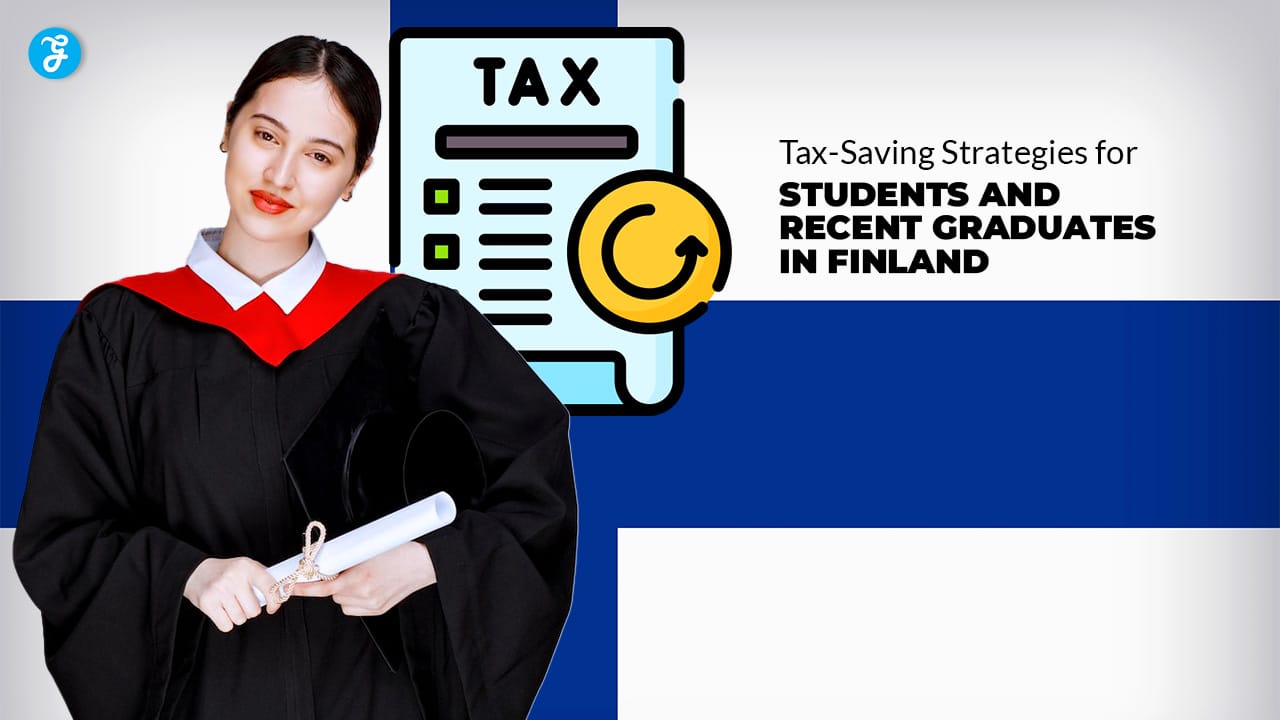Managing finances as a student or recent graduate can be challenging, especially when navigating Finland’s complex tax system.
However, the Finnish government offers numerous tax deductions, credits, and benefits designed to alleviate the financial burden for young individuals pursuing education or starting their careers.
This comprehensive guide explores 15 practical tax-saving strategies tailored to students and recent graduates in Finland.
From leveraging tax deductions to understanding Finland’s progressive tax structure, these strategies will help you save money and maximize your financial resources.
1. Utilize the Study Deduction (Opiskeluvähennys)
The Finnish tax system provides a specific deduction for students who pursue studies leading to a degree. This deduction is available to students with part-time jobs or paid internships.
How It Works:
- Report your study-related expenses, such as books, supplies, and tuition fees, to claim the deduction.
- Part-time job income is eligible for lower tax rates when combined with the deduction.
Why It Matters:
This deduction ensures that you can balance work and studies without an overwhelming tax burden.
2. Claim Tax Deductions for Housing (Asuntovähennys)
Housing is often a significant expense for students and recent graduates. Finland’s tax laws allow deductions for specific housing-related costs.
How It Works:
- If you rent an apartment due to studying or work, part of your rent may qualify for deductions.
- Keep rental agreements and receipts for verification.
Tip: Students living away from their hometowns due to studies are more likely to qualify for this deduction.
3. Take Advantage of Commuting Deductions (Työmatkavähennys)
If you travel between home and work or university, you may be eligible for commuting deductions.
How It Works:
- Deduct transportation costs, including public transport tickets or mileage if you use a personal vehicle.
- The deduction is capped, so check the annual limits set by Finnish tax authorities.
Why It’s Important:
This deduction is particularly helpful for students and graduates who commute long distances.
4. Maximize the Tax-Free Income Threshold
In Finland, students and recent graduates can earn up to a certain amount annually without paying taxes.
How It Works:
- The tax-free income threshold is set each year. Ensure you don’t exceed this limit if you want to avoid paying taxes on your earnings.
- If your income exceeds the threshold, only the excess amount is taxed.
Pro Tip: Plan your work hours and earnings to stay below this threshold whenever possible.
5. Deduct Study Loan Interest (Opintolainavähennys)
Students in Finland often rely on study loans to finance their education. The Finnish tax system allows deductions for study loan interest.
How It Works:
- Keep track of the interest payments made on your study loan.
- Include these payments in your tax return to claim the deduction.
Why It’s Beneficial:
Reducing the cost of borrowing can significantly improve your financial outlook as you transition into the workforce
6. Save with Social Security Contributions
While social security contributions are mandatory, they are also tax-deductible in Finland.
How It Works:
- Contributions toward pensions and health insurance can be deducted from your taxable income.
- Ensure these deductions are accurately reflected in your annual tax return.
Why It Matters:
This deduction lowers your taxable income, providing immediate financial relief.
7. Benefit from Education-Related Tax Breaks
Students who incur costs for additional certifications or skill-building courses may qualify for education-related tax breaks.
How It Works:
- Expenses for professional development or short-term courses can be deducted if they are directly linked to your job or future career.
- Keep receipts and course details for validation.
Why It’s Useful:
These deductions encourage lifelong learning while easing the financial burden of continuous education.
8. Explore Tax-Free Scholarships and Grants
Finland offers tax-free scholarships and grants to students under certain conditions.
How It Works:
- Scholarships or grants awarded by Finnish educational institutions or public organizations are often tax-exempt.
- Check the specific conditions for your scholarship to confirm its tax-free status.
Pro Tip: Always report your scholarship income to the tax authorities, even if it’s tax-free.
9. Use the Work-Related Expense Deduction (Työhuonevähennys)
If you work remotely while studying or have a part-time job, you can deduct expenses for a home office setup.
How It Works:
- Deduct costs for furniture, office supplies, and a portion of your electricity or internet bills.
- Maintain records to justify your expenses.
Why It’s Beneficial: This deduction is particularly relevant for remote workers or freelancers balancing work and studies.
10. Take Advantage of Reduced Tax Rates for Graduates
Recent graduates entering the workforce may benefit from reduced tax rates on their initial earnings.
How It Works:
- Graduates with modest starting salaries fall into lower tax brackets.
- File your tax return accurately to ensure proper application of tax rates.
Why It Matters: Starting your career with a lighter tax burden allows you to save more during the early stages of your professional life.
11. File for Tax Refunds on Overpayments
Many students and graduates inadvertently overpay taxes during the year due to limited financial planning knowledge.
How It Works:
- Review your annual income and tax deductions to identify overpayments.
- File a claim for a tax refund through Finland’s online tax portal.
Pro Tip: Set reminders to check your tax situation regularly to avoid missing refund opportunities.
12. Deduct Charitable Contributions
Donations to registered charities in Finland are tax-deductible.
How It Works:
- Ensure the charity is approved by Finnish tax authorities.
- Keep donation receipts for submission with your tax return.
Why It’s Rewarding: Supporting a good cause while saving on taxes is a win-win situation.
13. Monitor Tax Credits for Low-Income Earners
Low-income earners, including students and recent graduates, may qualify for additional tax credits.
How It Works:
- Finland offers credits for individuals with limited earnings to reduce their tax liability.
- Check eligibility criteria and include this credit in your annual tax return.
Why It’s Essential: Every euro saved can be reinvested in education or essential living expenses.
14. Utilize Spousal Tax Benefits
If you’re married, you may be eligible for spousal tax benefits.
How It Works:
- Spouses can share deductions or allowances, potentially lowering the overall tax burden for the household.
- File jointly to maximize benefits.
Pro Tip: Consult a tax advisor to understand the full scope of spousal tax benefits in Finland.
15. Stay Updated with Tax Regulations
Finland’s tax policies are subject to regular updates, which may introduce new benefits for students and graduates.
How It Works:
- Follow official tax authority announcements or consult tax professionals.
- Leverage new deductions or credits as they become available.
Why It’s Critical: Staying informed ensures you don’t miss opportunities to optimize your tax situation.
Takeaways
Navigating taxes as a student or recent graduate in Finland doesn’t have to be overwhelming. By utilizing these 15 strategies, you can reduce your tax liability, maximize savings, and take control of your financial future.
From claiming deductions on study-related expenses to leveraging spousal benefits, these tips are designed to help you make the most of Finland’s tax system.
Start implementing these strategies today to secure a financially stable tomorrow!






































